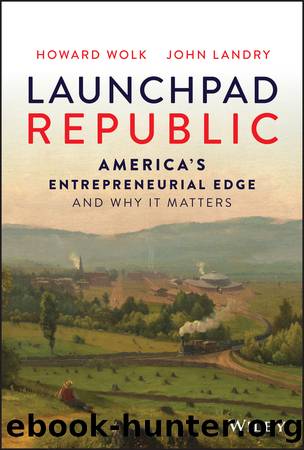Launchpad Republic by Howard Wolk & John Landry

Author:Howard Wolk & John Landry [Wolk, Howard & Landry, John]
Language: eng
Format: epub
ISBN: 9781119900061
Publisher: Wiley
Published: 2022-07-18T00:00:00+00:00
New Rights for Big Business
These countrywide developments eventually forced the federal government to take up a new question: Could entrepreneurs succeed so well that they became entrenched incumbents that stifle competition? Courts had long worked to remove privileges and promote open competition and freedom of contract. But what about firms whose competitive advantage came largely from scale economies rather than chartered monopoly?
The doctrine of ânatural monopoly,â and the evident chaos of âruinous competition,â had initially led justices to allow consolidation. Despite periodic panics and failures from overcapacity, the economy was growing, productivity increasing, and efficiencies proving themselves out. The courts often relied on the commerce clause of the Constitution to push back against state protectionism, such as a law subjecting Singer sales branches to licensing fees. Similarly, the Court forbade state regulators from requiring local meat inspectors for the national Armour meatpacking company. The Court also limited state rate regulation of interstate railroads, a rebuke that set the stage for federal regulation under the Interstate Commerce Commission.11
Most significant was the Supreme Court's extending âpersonhoodâ under the 14th Amendment to corporations, the ultimate triumph of Field's argument. In Santa Clara v. Southern Pacific (1886), the Court gave these businesses the same rights of equal protection as natural persons, thereby safeguarding them against arbitrary state action. âArbitraryâ came to mean any rule without a strong consumer rationale â protecting incumbents (or local workers) would not be enough.12
With personhood, corporations could avail themselves of the 5th and 14th Amendment protections against being deprived of âlife, liberty, or property, without due process of lawâ at both the state and federal level, rights that became known as âsubstantive due process.â These rights expanded over the next century and beyond, continuing to the present with controversial cases such as corporate political donations.
While the states were stymied, early federal efforts at regulation were only partially effective â and often helped these new incumbents. The Interstate Commerce Commission (ICC), formed in 1887, established federal regulatory control over large enterprises such as railroads, but did little at first. Most of its efforts centered on rationalizing rates and competition for the benefit of established corporations. Only later did the ICC discourage the sort of discriminatory freight rates that Rockefeller had used to squelch his opponents. Likewise, the Sherman Antitrust Act of 1890 promoted open, fair competition, but set no enforceable policy.13
Moreover, a conservative Supreme Court seemed to lag the sentiment of Congress by at least a decade.14 In one wellâknown case, the Court decided that the Sherman Act would not even apply to manufacturing.15 In another, the Court said the federal government could prohibit egregious restraints on trade, but monopolies per se were not illegal and were perhaps a fact of economic life.16 Ironically, in supporting these new enterprises the Court sometimes took a limited view of the definition of interstate commerce (they had often used a broad interpretation to curb state actions) or deferred to the statesâ chartering authority over corporations as a justification for limiting the intervention of the federal government.
Download
This site does not store any files on its server. We only index and link to content provided by other sites. Please contact the content providers to delete copyright contents if any and email us, we'll remove relevant links or contents immediately.
The Future Internet by Bernard Marr(544)
Focus Group Methodology by Pranee Liamputtong(512)
Python for Finance Cookbook by Lewinson Eryk;(472)
Empowering Public Speaking by Deanna L. Fasset & Keith Nainby(442)
Doing business with Japan : successful strategies for intercultural communication by Kazuo Nishiyama(424)
Global Orders and Civilizations : Perspectives from History, Philosophy and International Relations by Sadik Unay; Muzaffer Senel(345)
Engaging with Ethics in International Criminological Research by Michael Adorjan Rose Ricciardelli(334)
Intentional Power: The 6 Essential Leadership Skills For Triple Bottom Line Impact by Lisen Stromberg & JeanAnn Nichols & Corey Jones(300)
Analysis of Financial Statements by Frank J. Fabozzi & Frank J. Fabozzi(298)
The Economics of Banking by Jin Cao(292)
Entrepreneurial Marketing by unknow(285)
The Three Skills of Top Trading by Hank Pruden(284)
Focus on Teaching by Jim Knight(268)
The Oxford Handbook of Banking and Financial History by Youssef Cassis;Richard S. Grossman;Catherine R. Schenk;(264)
Data Science and Analytics for SMEs: Consulting, Tools, Practical Use Cases by Afolabi Ibukun Tolulope(257)
New India by Arvind Panagariya(254)
Building a Career in Cybersecurity: The Strategy and Skills You Need to Succeed by Yuri Diogenes(251)
Financial Statement Analysis by Martin S. Fridson;Fernando Alvarez; & Fernando Alvarez(245)
Maximum Success with LinkedIn by Dan Sherman(229)
